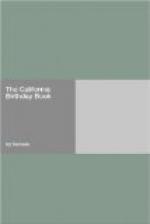CHARLES F. LUMMIS, in The Right Hand of the Continent, Out West, June, 1902.
NOVEMBER 30.
By a queer sequence of circumstances, the essays, begun in the Lark, were continued in the Queen, and, if you have read these two papers, you will know that one magazine is as remote in character from the other as San Francisco is from London. But each has happened to fare far afield in search of readers, and between them I may have converted a few to my optimistic view of every-day incident. To educate the British Matron and Young Person was, perhaps, no more difficult than to open the eyes of the California Native Son. The fogs that fall over the Thames are not very different to the mists that drive in through the Golden Gate, after all!
GELETT BURGESS,
in The Romance of the Commonplace.
DECEMBER 1.
The Bohemian Club, whose real founder is said to have been the late Henry George, was formed in the ’70’s by newspaper writers and men working in the arts or interested in them. It had grown to a membership of 750. It still kept for its nucleus painters, writers, musicians and actors, amateur and professional. They were a gay group of men, and hospitality was their evocation. Yet the thing which set this club off from all others in the world was the midsummer High Jinks. The club owned a fine tract of redwood forest fifty miles north of San Francisco. In August the whole Bohemian Club, or such as could get away from business, went up to this grove and camped out for two weeks. On the last night they put on the Jinks proper, a great spectacle in praise of the forest with poetic words, music and effects done by the club. In late years this has been practically a masque or an opera. It cost about $10,000. * * * The thing which made it possible was the art spirit which is in the Californian.
WILL IRWIN,
in The City That Was.
DECEMBER 2.
Nearly all is now covered with a luxuriant growth of vegetation the most diverse, yet all of it foreign to the soil. Side by side are the products of two zones, reaching the highest stages of perfection, yet none of them natives of this coast.
Gay cottages now line the roads where so recently the hare cantered along the dusty cattle-trail; and villages lie brightly green with a wealth of foliage where the roaring wings of myriads of quail shook the air above impenetrable jungles of cactus.
T.S. VAN DYKE,
in Southern California.
DECEMBER 3.
* * * The chief and highest function of the University is to assert and perpetually prove that general principles—laws—govern Man, Society, Nature, Life; and to make unceasing war on the reign of temporary expedients. * * * There never was a period or a country in which the reign of fundamental law needed constant assertion and more perpetual proof than our own period and our own country. * * * The living danger is that society may come to permanently distrust the reign of law. * * * A national or a personal life built on expedients of the day, like a house built on the sand, will inevitably come to ruin.




